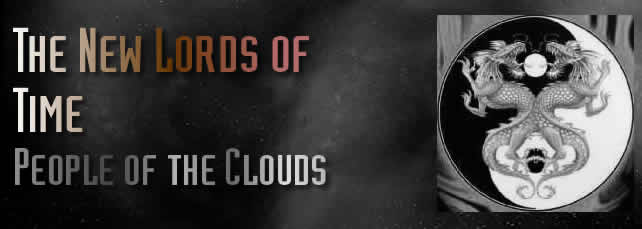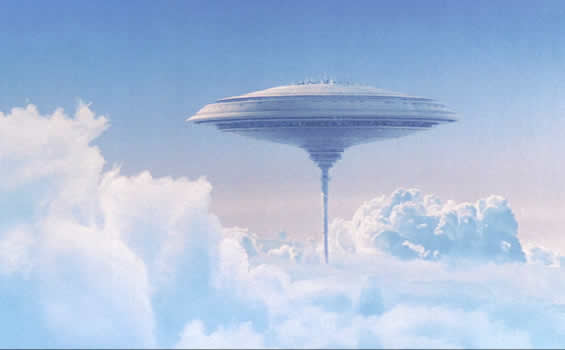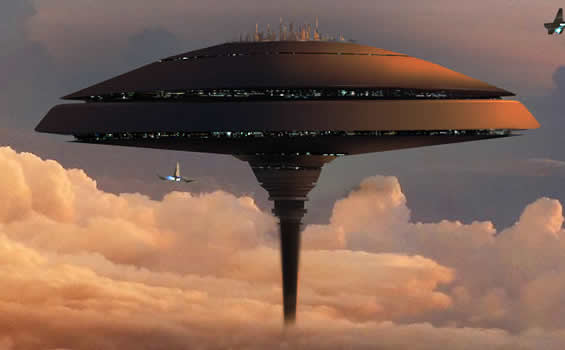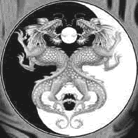

“What sort of planet is this?” Trudi Gregory-de Lœngbærrow asked as she stepped out of her husband’s TARDIS onto a wide metal balcony or platform, walkway - she wasn’t quite sure what to call it. Settling on ‘balcony’ she noted that it circled a huge metal domed structure. She abandoned comparisons with St. Paul’s Cathedral and other such structures and mentally compared it with Birmingham’s Bull Ring, the shopping centre where she used to work before Tristie took her away from all that.
It was many times bigger than the Bull Ring.
Looking over the parapet she was surprised to see the biggest cloudbank she had ever seen in her life. Not only the biggest, but the only one she had looked at from above. It was about twenty metres beneath her viewpoint and stretched for what had to be hundreds, if not thousands, of miles in every direction. She looked down and around and then up to see three yellow suns and four white and one big red moon in a pale lavender sky that the best album cover designers of her generation couldn’t have imagined. The clouds reflected that beautiful colour and managed to resemble something a surrealist artist might find in one of his wildest dreams.
The dome where she stood was at the top of a structure that rose out of the cloud. A distance away several other structures could also be seen. Some were domes like this one, others towers or geometric shapes. She couldn’t tell if they rose up through the cloud or were floating in it like very unlikely ships at sea. She asked Tristie as he came out to join her.
“Not exactly floating. More in geo-synchronous orbit. The planet below is a lot like Earth in size, but it is uninhabitable because of this layer of hydrogen gas that surrounds it, blocking all sunlight and preventing plant growth, or even the formation of water molecules. It is one big, cold, dark desert.”
“So, there’s nothing living down there?”
“Nothing. The planet is sterile.”
“So… what are all these buildings or… whatever they are….”
Tristie grinned.
“You’ll get the official tour, soon enough. That’s why we’re here. The Doctor asked me to find out what’s going on and report back to him.”
“The Doctor asked YOU, I mean, US, to go on a mission for him? How come? He has loads of other people - your uncles, Chris and Davie, his own sons and daughters….”
“I had a long chat with him while you and Rose were talking about childcare. He reckons I’ve been flying around the universe just for fun long enough and I ought to ‘earn my stripes’. So, while they babysit Tristie Junior we’re on a sort of diplomatic fact-finding trip.”
“Ok… cool,” Trudi accepted. The idea pleased her. It meant that Tristie was being taken seriously by that huge dynasty of Time Lord-human hybrids he was descended from.
“What does The Doctor THINK is going on here?” she added after a few minutes further thought.
“He’s not sure. Something isn’t right, he said. But… apart from living in the sky above a dead planet, which doesn’t seem quite right to me, I can’t see….”
His train of thought was derailed by the actions of a man who had just stepped out from the dome through a soundless and smooth operating sliding door. He had assumed this was the hospitality director he was expecting to meet them, but the oddly distracted man with a blank, staring expression walked past them both and began to climb the parapet.
“Tristie!” Trudi warned, but he was already moving cautiously towards the man, ready to stop him doing what he was doing.
“Hey, come on, it can’t be all that bad,” he called out. “I’m sure there’s nothing so bad that it can’t be talked through. Here, grab my hand and come on back over this side of the barrier.”
Tristie almost had a handhold before the man jumped. Trudi screamed in horror as his body plummeted towards the clouds and was enveloped by them. For a crazy moment she expected the fluffy whiteness to cushion him, but that was impossible. He must have fallen straight through into the void beyond.
“I tried,” Tristie said as he turned and embraced her. Who was giving comfort to who wasn’t certain for a little while. They just clung to each other and mourned the futile loss of life they had just witnessed.
“Hello!” A curiously steady and unconcerned voice disturbed them. Both looked around to see a woman carrying a sort of electronic clipboard. She was what Trudi tended to call ‘humanish’, being of a brown-green complexion with deep green hair that was swept back from her face by a wide band of cloth but fell beyond her waist at the back. It was a hairstyle Trudi would have died for in her hippie inspired younger days, but just now it was the last thing on her mind. The sight of that man’s body disappearing into the cloud was still haunting her.
“You must be the observers we were told to expect,” the woman added, adopting the human greeting of a handshake in an awkward way that suggested it wasn’t quite the thing in her society. “I am Tamara Schul. I am to show you everything you wish to see. But first, may I offer you refreshments?”
“Refreshments?” Trudi repeated, more than a little perplexed by the air hostess cheerfulness of the woman. “But… didn’t you see? Just now. A man just killed himself.”
“Oh… don’t worry. That matter will be dealt with,” Tamara assured her breezily. “You really must not worry about that. Come along. I am sure you will see that our community runs perfectly amiably and efficiently.”
Trudi wasn’t sure those two adverbs could be used to describe any one thing, let alone a community. Efficiency wasn’t particularly amiable.
Besides, that man didn’t look amiable. He looked as if his mind had snapped, perhaps under the strain of trying to be efficient and amiable at the same time.
Tamara brought them into the dome, which was at least two miles in diameter. They were both surprised to find themselves in an indoor garden of trees, lawns, flower beds, all growing under what looked like a huge, perfectly transparent glass roof through which the lavender sky and its collection of suns and moons were visible.
“Polarised steel, transparent from the inside, with its own fully functioning artificial ozone layer - making it safe to sunbathe if you really wanted to,” Tristie observed. “Very advanced. They haven’t worked out how to do transparent steel on Earth in my time, let alone polarising it.”
“Our engineers perfected the technique within the last decade,” Tamara explained. “Before that, all our food crops were grown in hydroponic tanks with artificial sunlight. This is much more amiable. We are able to have recreational plants as well as those essential for nutrition. As you can see, the community enjoys the facility very much.”
They could certainly see that. Nobody was actually sunbathing, but there were people enjoying the grass for walking and picnicking. They all, male and female, adults and children, had the long hair that Tamara sported. It was obviously a cultural or racial trait.
They all seemed to be happy. It looked like a pleasant enough environment.
Which made the suicide all the more perplexing.
What they were shown really did look like an amiable community of happy, healthy people. It was also surprisingly efficient. A turbo lift brought them to the deck where hydroponics was still used to experiment with food production. There was also the cruelty free but rather odd looking clone meat factory. Trudi agreed that it was far more amiable than an abattoir, but the process of making meat by forcing cells to come together in tanks of amino acids made her determined to eat vegan for the duration of her visit.
There were living quarters for the people who lived within what Tamara called ‘Habitat 459’ to distinguish it from the other cities in the sky. These were neat and tidy with all modern conveniences, and attempted to be efficient and amiable, though Trudi still wasn’t convinced that the two could be applied at once.
On the living floor there was a huge communal plaza with fountains of recycled water created in hydrogen-oxygen chambers in the very lowest levels of the habitat alongside the efficient hydrogen engines that kept them suspended in a low geo-synchronous orbit. People walked and sat in their little family groups and seemed perfectly amiable.
There was a large screen suspended above the plaza. It displayed slowly revolving abstract images and played soft music most of the time – an amiable addition to the recreation of the people. As Tamara was explaining about how the habitat supported ten thousand family units in an amiable and efficient manner, the screen cleared and the inhabitants were warned that a population announcement was imminent.
“A… what?” Trudi asked.
“You will have realised,” Tamara explained. “That all the habitats are limited by the resources we can produce. Overcrowding and famine would be against every principle we live by.”
“They wouldn’t be amiable or efficient?” Tristie remarked dryly.
“You understand,” Tamara answered with no trace of irony in her tone. “That is why all family units are restricted to a maximum of two children, and newly bonded couples have to wait for permission to reproduce. Licenses are issued by lottery whenever a population gap becomes available.”
Trudi had a question, but she held her tongue as the announcement came.
“A population gap of ONE has become available in the last hour,” said a voice with all the efficiency and none of the amiability of a train cancellation. “Family unit Markiss 23 has been issued a one child reproduction licence. Amiable news for all the community.”
The screen resumed its geometric patterns and light music, but Trudi no longer found it in any way amiable. She had just put two and two together.
“That family… are allowed to have a baby, now, because… because of the man who killed himself in front of us… making room for them to… reproduce.”
Tamara confirmed her assumption but seemed unable to understand why it was so upsetting to her.
“It is just the same as when there is an accident, or when one of our elders dies of natural causes. They open up a population gap.”
“But…” Trudi began, then shook her head in despair. “But… If your lives are so restricted that you have to wait for somebody to die before a new baby can be born… why do you live this way? Aren’t there better planets to colonise? I’ve seen some beautiful places like… like paradise.”
“But we are not colonists,” Tamara answered. “This is our world. We are descendants of the last people to live on the surface of Vollis IV. The break up of Vollis III, a small, tectonically unstable planet, destroyed our atmosphere and laid waste to the planet’s surface. Our scientists built the habitats and a lottery was taken of those young enough and strong enough, those with talents that could be used in our new life. They came to live above the clouds.”
Trudi looked at their host for a long moment.
“You mean… there were others left behind… to die.”
Tristie had been about to ask the same question, but with less emotion in his voice. He had already realised that some pragmatic decisions must have been made by the generation facing such an apocalypse. It was not a pretty thought, but it was understandable in the circumstances.
“The old, the sick, those who would be a burden, unproductive….” Tamara explained. “The facts are known. We study them in our history. The Left Behind had food supplies to last a dozen years, hydro plants for power… light and warmth. They did not suffer. But they were the last generation to walk upon the ground. The rest of us… live amiably and efficiently….”
“If I hear those two words again, I will throw up,” Trudi snapped. “I’ve seen enough of this place. I’m going back to the TARDIS.”
She stalked away, then stopped, realising that the turbo lifts were in the other direction. She turned. As she did so, another announcement warning flashed across the screen.
“What now?” she demanded. But nothing could have prepared her for what she heard next.
“Correction to previous announcement,” the same emotionless train delay voice announced. “The census of two hours ago has been found to be erroneous. There is no population gap. Instead, there is a population overrun of one. The reproduction licence for Family Unit Markiss 23 is suspended until a further population gap is created. Volunteers for the euthanasia project may, of course, make themselves known at any time.”
“The WHAT?” Trudi exploded. “Do you mean to say people kill themselves in order to make room for new babies?”
“There is a voluntary programme,” Tamara ventured.
“The man earlier.…” Tristie began tentatively. “Was he….”
“As I understand it, he was suffering from a disorder of the mind and chose to end his life without reference to the efficiently monitored voluntary programme,” Tamara answered. Trudi glared at her, not only for using the word efficient again but for the casual manner of her tone.
Then she put two and two together and screamed so shrilly that the amiability of the people in the plaza was thoroughly disrupted.
“Tristie!” she exclaimed. “The ‘erroneous’ census… the two extra people that means that family don’t get their baby and somebody else has to volunteer to die…. It’s US. You and me. We’ve been counted as part of the population.”
Tristie looked at her incredulously. For a moment Trudi wondered if she could be wrong. Then he nodded grimly and turned to Tamara.
“She’s right, isn’t she?” he said in a carefully measured voice that was holding back his anger.
Tamara consulted her clipboard. She frowned in an unamenable way and then gasped in astonishment.
“It is a computer error,” she said. “Visitors are… of course… not to be counted in the census. I must report this….”
“You do that,” Tristie told her. “Meanwhile we’ll be leaving. I have enough information for my report.”
With that he took Trudi to the turbo lift. As they emerged onto the garden level under the polarised roof they heard the correction of the correction giving the Markiss family unit their reproduction licence back.
But Trudi was not reassured by that small victory. Even aboard the TARDIS she was still fretting about all she had witnessed.
“What are you going to tell The Doctor?” she asked.
“I’m going to tell him that these people should be given emergency relocation to a suitable colony planet,” he answered. “They can’t go on like that. I get the idea from Tamara that they WANT to stay on their home world. I can understand that. But….”
He paused and scrolled rapidly through several screens of information.
“Wait a minute….” He moved around to the environmental monitor and looked at several graphics that were completely meaningless to Trudi. Then he checked the database again and re-read the screens of information.
“Whatever it is… I’d rather just get away from this wretched planet,” Trudi told him.
“I thought that was what I wanted, too,” Tristie told her. “But I might have found something … that could help everyone here, and really give me some kudos when I report back to The Doctor.”
Tristie’s enthusiasm could be infectious. Besides, when he explained what he had in mind Trudi knew she couldn’t really say no.
He took the TARDIS down through the cloud in ordinary power mode, just like a helicopter descending through the mile thick hydrogen cloud and through the dead atmosphere below. She was surprised to find that it wasn’t completely dark. It was more like a dreary February in England. But the TARDIS monitors told how cold and lifeless it was. Nothing grew in the iron-coloured ground. Nothing lived where once a thriving world had been.
“What’s that?” Trudi asked as the TARDIS approached a shape that rose up from the dry, lifeless ground. “It looks like a… what do you call it, like in Canada… a geo whatsit dome.”
“Geodesic,” Tristie answered her. “Yes, it is.”
“Left over from before the disaster?”
“No, built afterwards. I’ve never seen one as big as this. It has to be about five miles wide and if my calculations are right its foundations are ten times as deep in the ground.”
“Wow.”
“Wow, indeed. Let’s take a look inside.”
They looked. Everything Tristie had expected after reading the data the TARDIS had collated was there. It was just waiting for somebody to come along and make it work.
“Is it up to us to do it?” Trudi asked.
“I think it is,” Tristie answered her before setting the process going. “And then we need to tell those people up in the sky all about it.”
They didn’t need to land on any of the geo-synchronous habitats again. He could connect to the public address screens on every platform at once from the TARDIS. Trudi watched him with a deep sense of pride and imagined the people in that plaza or having their leisure time under the polarised steel domes coming to terms with what they had discovered.
“First of all, your history has become confused,” Tristie told the inhabitants of the habitats. “You thought that your ancestors had left the elders of your world to their fate below. In fact, the Elders SENT them to the sky while they prepared for your future. They knew that those who stayed, among them some of the most learned scientists, engineers, architects, could best work towards restoring the planet without worrying about the survival of the population. They dedicated their last years to building a converter that would turn the hydrogen layer back into the water that would make the planet fertile again. Knowing that they had achieved that much they died satisfied that you, their children’s children’s children, the generations to come, would inherit the fruits of their labours. That inheritance should have been claimed generations ago. It has been waiting for you. The instructions for initiating the converter and beginning your new future were lost somehow. But it has now been set in motion. It will take a few years for the land to become fertile, for lakes and rivers to water it, for natural weather cycles to settle down, but when it does, you can plant crops. You can go down to the DNA databanks and bring birds and animals, pollinating insects, all back to the world. You can live in wide open spaces. In the meantime, you don’t have to restrict your lives any more. Have as many babies as you like. The world below needs repopulating. And for Chaos’ sake, stop these euthanasia programmes. Nobody needs to die until they’ve lived a long, useful and happy life. So… good luck all of you. I’ll probably stop by and see how you’re getting on some time. But bye for now.”
He closed the outgoing transmission, but for a few minutes he kept an incoming broadcast of jubilant voices cheering all over the habitats. Trudi kissed him fondly.
“Don’t look too triumphant when you report to The Doctor. He’ll warn you about being big headed, what with you saving a whole planet like that. But keep grinning until then. I’m proud of you.”
He carried on grinning.

 |
 |
 |